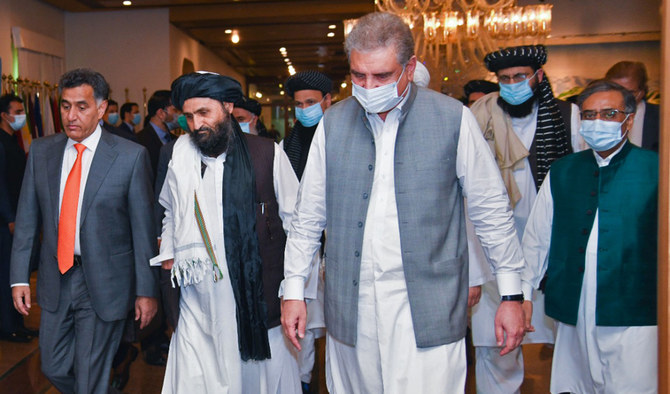ISLAMABAD: A high-level Afghan Taliban delegation, led by Mullah Abdul Ghani Baradar, met Pakistan’s Foreign Minister Shah Mahmood Qureshi on Tuesday to try to help launch the intra-Afghan talks in the war-ravaged country.
Qureshi told the delegation that his country had always maintained that the only way to reach an enduring settlement in Afghanistan was through Afghan-led and -owned negotiations.
He said that Pakistan had been working in that direction, adding that its efforts succeeded when the United States and Taliban arrived at a peace agreement in February this year.
The foreign minister hoped that the Afghan administration in Kabul would also try to benefit from the “golden opportunity,” though he also warned the Taliban that the Afghan peace process could be “sabotaged by spoilers.”
Qureshi noted that his country would continue to work for the stability of the region and was thanked by the visiting delegation for his country’s efforts to bring peace to Afghanistan.
Earlier in the day, Taliban chief negotiator Sher Abbas Stanekzai said that the head of the Afghan Taliban finalized a 20-member negotiating team for upcoming talks between the Kabul government and the insurgent group, thirteen of whom are from the group’s existing leadership council.
Afghanistan’s government and the Taliban have agreed that Doha will be the venue for the peace talks, known as the intra-Afghan dialogue, which will be the first high-level meeting between the two sides after nearly two decades of fighting.
“All decision-making powers are with the negotiations team, which has 65 percent representation from the ‘Rehbari Shoura’ [Taliban leadership council],” Stanekzai told Arab News via audio message from Doha, Qatar, where the insurgent group has had a political office since 2013. “They will take the process forward... and are now involved in internal consultation to chalk out a strategy.”
Stanekzai said Sheikh Hibatullah Akhunzada, the leader of the Afghan Taliban, would have the authority to devise the council’s strategy and sign agreements with President Ashraf Ghani’s government in Kabul.
The 20-member negotiation council includes several of Akhunzada’s close aides such as Sheikh Abdul Hakeem, Maulvi Abdul Kabeer, Maulvi Noor Mohammad Saqib, Mullah Shireen Noorzai, Sheikh Qasim Turkmen, and Abdul Manan Omari, who is the brother of Taliban founder Mullah Omar.
The crucial intra-Afghan talks are part of a historic peace deal signed between the Taliban and Washington in Doha earlier this year, which outlined a roadmap for withdrawing foreign forces from Afghanistan and peace talks between Kabul and the Taliban to end the 19-year war.
No date has been announced for the talks yet, but they were set to begin following the release of 5,000 Taliban prisoners by the Afghan government, a condition of the Doha deal. There was deadlock earlier over the release of 400 ‘hardcore’ Taliban prisoners, but Ghani announced on August 9 that he would free them “soon.”
“Kabul had agreed to release prisoners but later deviated from its commitment,” Stanekzai said. “We will not start intra-Afghan dialogue even if our one prisoner stays in jail. Every prisoner is a hero.”















